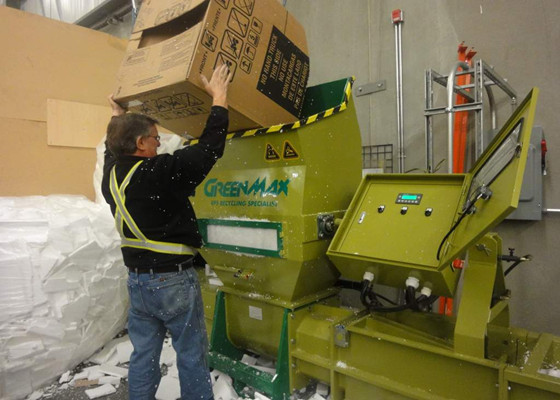INTCO Recycling can Solve the Problem of Waste Polystyrene Flooding Greatly
Research shows people across England use 2.7 billion pieces of disposable cutlery and 721 million disposable plates every year, the majority of which is plastic, but only 10% of this is recycled. If 2.7 billion pieces of tableware were lined up, they would circle the earth more than eight and a half times.
Disposable plastics refer to plastic bottles, polystyrene packaging, containers, and other products that are used once and then discarded. Polystyrene products are widely used because of their shock-resistant, waterproof, and thermal insulation properties, not only to preserve food but also to protect fragile products such as electronics during transportation. Therefore, the application of polystyrene has penetrated every aspect of people's daily life. Polystyrene is made from non-renewable resources such as oil and is not biodegradable, however, most of it is discarded into oceans or landfills. The European Union predicts that ocean polystyrene pollution will increase to 150 million metric tons by 2025. o how should we properly dispose of used polystyrene?

Actually, many used polystyrene products can be recycled and granulated through machines. It's a shame that people don't realize that foam can be recycled and made into new products. GREENMAX, affiliated to INTCO Recycling, is a team that provides comprehensive polystyrene recycling solutions. It is a professional team that integrates business consulting, equipment provision, raw material procurement, and transportation services. GREENMAX can provide different models of machines with different capacities to customers around the world, targeting almost all foams. When the loose foam is fed into the polystyrene recycling machine, it will be crushed into small pieces, which are then compressed with a screw to reduce the volume and increase the density. Finally, the compressed polystyrene ingots will be conveyed through the channel of the machine. At the same time, the GREENMAX machine has an automatic cutting function, and the long foam ingots will be cut into blocks for easy manual transportation. These recycled foams will be transported to INTCO's factory in Malaysia for granulation, and then made into frame products, such as photo frames, picture frame molding, and so on. INTCO is committed to global polystyrene recycling and environmental protection, and has a unique polystyrene recycling system, from recycling waste foam, compression, and granulation to reproducing new products. At the same time, INTCO also purchases polystyrene ingots from around the world to manufacture various environmental-friendly products.

INTCO has more than 20 years of experience and can design machine models with special requirements for customers. INTCO proposes targeted recycling solutions for different customers. Whether it is a well-known brand company such as Nestlé and Pepsi-Cola, or a recycling factory with several people, they will have solutions and equipment plans for different materials.
